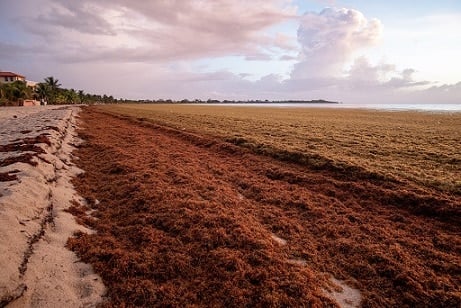Minister David Collado urgently asked the members to find a solution to common issues being faced in the Caribbean such as the problem with sargassum that is affecting the entire region.
“The solution to the sargassum problem cannot be individual,” said Collado in his opening remarks at the 118th meeting of the UN World Tourism Organization (UNWTO) Executive Council, which began this Wednesday in the touristic eastern region of the country and will last until tomorrow Thursday.
He said that solutions should be sought to the issues that affect the region at a general level, referring to sargassum. Collado added:
“Organizations like this one should help small countries to find solutions when we don’t have them.”
Sargassum is a large brown seaweed that floats in the ocean in great masses, sometimes for miles, but does not attach to the seafloor. While there are benefits of this seaweed, such as providing food, refuge, and breeding grounds for many animals such as fishes, sea turtles, marine birds, crabs, shrimp, and more, it does also create problems for fishermen, vessels in the ocean shipping lanes, and tourism.
The seaweed grows in the Amazon River area and continues to bloom and move with the current until it arrives in mass in the Caribbean. Once the Sargassum reaches land, it starts to decompose and smells a lot like rotten eggs, and stench carries inland for about a half mile, wreaking havoc on Caribbean destinations that depend on sand, sun, and sea.
While Minister Collado thanked the UNWTO for choosing the Dominican Republic to hold its 118th meeting for the first time in history, he also indicated that tourism is not a luxury for the Dominican Republic. The success of tourism is something essential due to the impact it has on the economy, which represents more than 25% of the Gross Domestic Product (GDP).
At the UNWTO meeting, Minister Collado was accompanied by the Dominican ambassador to that body, Aníbal de Castro, and the Vice Minister of Tourism, Carlos Peguero, among other officials. Nineteen ministers from 38 nations were present, including the 35 member countries and 3 observers, as well as some 200 delegates, who participated in this 118th meeting of the UNWTO, which has been in progress from last Tuesday to today.



I fully agree with Frank Comito’s comments. The article itself is generally informative but the headline is immflatory and totally misleading. While the sargassum is a nuisance and unsightly at times most destinations are able to remove it before it gets to that stage. I have never experienced the stench carrying half a mile inland. This type of journalism is more dangerous to the region than the sargassum itself.
THIS comment was received by email and we’re posting manually .
Good Day Linda –
While I welcome receiving my steady dose of news from ETN, I was taken aback today by the headline
‘Caribbean Tourism Stinks Literally’. While sargassum is a huge problem which is being worked on at several levels and requires accountability and actions by the causal states, the headline unintentionally and misleadingly paints a broad swipe of a region
where every destination and beach is awash with the weed and the region ‘stinks’ to high heaven. It gives cause to travel advisors, the travel media and consumers to reconsider their interest in the entire region.
In reality, over 90 percent of the region is unaffected on any given day and for those tourism areas which are, the industry and governments are allocating a tremendous
amount of precious resources to address the problem.
The DR Minister is to be applauded for advancing the need for greater collaboration by the region AND action from the countries which are sources for the proliferation
due to their poor environmental management. This is something which the Caribbean Hotel and Tourism Association, which I’m associated with, has advanced as well, along with training and guides the CHTA has provided to the industry on managing and mitigating
the problem. CHTA’s online ‘knowledge center’ has a significant amount of resources and information available to the tourism industry to assist them with this.
The Caribbean has worked hard over the past three years to put in place health safety protocols to expedite our recovery from the pandemic and has been one of the
world’s bright spots on tourism’s recovery due to our collaboration. Sargassum presents another spot where that collaboration is necessary.
The substance of your article is not in contention. The headline is. It’s misleading and unfortunately can have a negative impact on bookings to the region.
Much as we’ve been challenged as an industry to dispel the misconception that when a hurricane strikes one area of the Caribbean that the entire Caribbean has been devasted, (with good results I would add, as more in the media have come to understand our geography and the fact that overwhelmingly most of the Caribbean is left untouched when a hurricane strikes a part of the region), we need to dispel any misconception that sargassum is covering the entire region. It’s a challenge for the region. We don’t want to sugarcoat that. But we also don’t want the entire region to suffer when most of the region is unaffected.
Please take my comments in the constructive and instructive manner intended.
Frank Comito
Frank J. Comito
Special Advisor and Former CEO/DG
Caribbean Hotel and Tourism Association